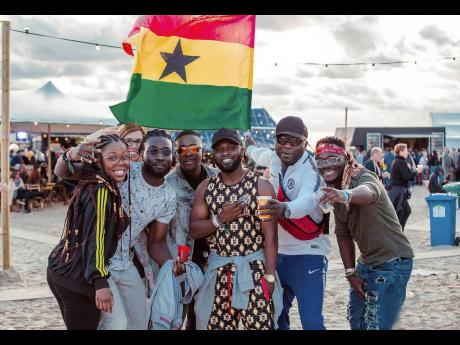Organisers of reggae festival with the ‘bad wud’ name speak
It has been instilled in most Jamaicans from the earliest days of childhood that some words are forbidden; simply put, they are ‘bad words’. From the word that means female dog (that has earned the definition of a lewd female) to the various “clots and cloths,” children dare not say them when an adult is close by.
Still, these words are signature expressions and have been colourfully positioned on souvenirs and clothing to represent all things Jamaican. More recently, the topic surfaced that even persons overseas are “selling” the expressions, while locally, saying the word in a public space results in a $2,000 fine, if uttered in the presence of a law enforcer.
Wannes Loosveldt snickers at the thought of forking out money to promote the name of the reggae-dancehall festival that he, along with his brother Bram, have worked so hard to gain recognition for in their homeland, Belgium.
Being exposed to Caribbean culture, and more specifically calypso, reggae and dancehall music during their childhood years, the Loosveldt brothers had an idea to share their passion for the genres.
“We had the idea to have a music festival which spoke to the people both Europeans and Jamaicans; in searching for a name one stood out. Recognising that it was considered a bad word or that it was not a word that persons threw around, and illegal in some respects, I underestimated the response, because it is heard so often here and is also in the music we listen to,” Loosveldt shared in an interview with The Sunday Gleaner.
The reason for the name selected to brand the festival, he adds, “is that the B-word stirs some commotion. The fact that we chose that name and not Ackee, Roast Fish or Pull Up Festival, or any other name that is more ‘decent’ in the eyes of the rulers, is because we know it is powerful and will not be forgotten. People will see, hear and talk about it because it moves people. We are not just another reggae festival by foreign people who have their own view on the culture and do whatever we want. No. We are people who share similar visions with people of the culture and want to make a contribution.”
The B&%@#cl$t Festival is scheduled to happen for the third time, at the biggest beach in Belgium, Zeebrugge Beach. It has the reputation of bringing some of Jamaica’s leading names in reggae and dancehall as headliners, among them Tarrus Riley, Gyptian, Anthony B, Charly Black and Konshens in the past, and this year’s staging features Busy Signal, Spice, Serani and Tanya Stephens.
“Over the three years, the festival has been big. I always could counter some of the negative comments from people who are thinking, ‘what these white festival organisers do is take things that is not belonging to them like the culture and exploit it’ by saying we have never gained one euro yet by organising it. The fact is that we pay the artistes what they deserve and there are also members of the Jamaican diaspora living in Belgium who we support, like popular chef Mama Suzie,” he explained.
With all the noise surrounding the event, which will take place over two days, Friday, August 23 and Saturday, August 24, he says, it is still one of the smaller music festivals. While it grew from 6,000 patrons to 10,000 in the first two years, it does not compare to others that pull over 200,000 people over a weekend and there are more festivals than there are days in the summer.
Though small, the support for the festival is there, he said. “Bounty Killer is not the first to put our festival name in the spotlight, but nobody did it as explicitly as the dancehall superstar did on his Instagram account,” Loosveldt explained.
In his post, the veteran dancehall artiste called out the government and law-enforcement officials for being stupid.
Bounty Killer said, “Unuh look pon that (expletive) di B&%@#cl$t Festival, the word (expletive) bigger than the government and di force and what is the true meaning of (expletive) though who defines that, since it is not in the dictionary.”
Loosveldt pointed out that, it is not fair for the existing generations to elaborate on the literal translation of the word. He said the origin of the word is lost in history, but acknowledges that has become a global expression of intense feelings, both positive and negative. And although the word is shunned in Jamaica, it is used all over the planet to express happiness or frustration.
“Where and when it was made illegal is unclear to us, but it seems to us no reason not to use the word. There are other things that are still illegal in Jamaica that embody the Jamaican culture. It seems more logical to us to strive for legality on the mother island than to banish the term in other places. That only undervalues the power of the word,” he said. “My children know the word and use it. Over here it’s not bad, it’s a free expression. Finally, I identify myself with the community, despite colour or race, and this is my way of showing support to the movement, and we have created a platform so that the message that is carried by the music can be spread.”
A featured act on last year’s stage, Mr Vegas told The Sunday Gleaner, “Europeans use the word when we use it in song, and even while having dialogue it makes their faces light up. People are learning to pronounce the word across the globe while we here are demonising it.”
“The B&%@#cl$t Festival was a marvellous experience, unlike here [in Jamaica] where the Constitution is written to keep us in slavery; meaning we have no freedom of expression,” he ended.




